Collaborating with another musician or artist can be done in many more ways during these modern times than ten years ago. Where “back in the day” band members or singers would have to be present in a studio or recording environment, the internet and technological development have made artist collaborations dramatically easier.
Exploit All Avenues Of Learning!
Picture this: you’ve worked hard on a project for weeks or months. Then, you listen for the 1247th time, and you begin to question the track’s flow, feel, mix, or even melodies.
Bouncing ideas off a fellow artist or musician can be hugely valuable, especially when your ears become “fatigued” from repetitive listening.
This is where collaboration can help you.
Even if you don’t specifically work on a project with someone, collaboration can still occur by sharing the idea with someone in the same field.
There will always be something you can take away from this experience.
I found it eye-opening to hear constructive criticism and positive feedback and reinforcement, where I may have considered otherwise.
What Is Music Collaboration?
The words music and collaboration are synonymous with the music industry. It is the coming together of like-minded individuals to undertake the creation process of music.
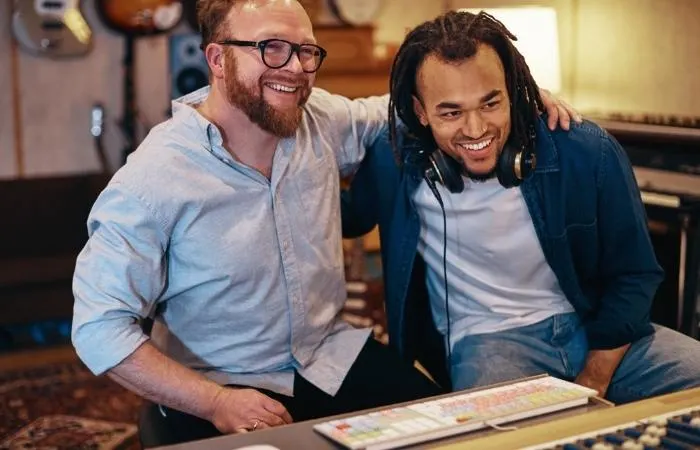
Whether it be a band, solo artists teaming up with other artists, or perhaps one-off projects where a group recruits an artist to create with.
This, of course, can apply to music made by singers and performers that play instruments, as well as those of the technological mindset such as a music producer.
What Are The Benefits Of Music Collaboration?
Sharing Different Skills And Ideas
You will have seen people sharing tips, tricks, or workarounds for music production out there in the realms of Instagram, Facebook, etc.
A considerable part of this information has been picked up from sharing ideas with other artists.
There is so much depth to different DAWs (Digital Audio Workstations) that there is much that takes time to discover on your own, so sharing what you learn not only helps others, but you will likely learn something in return.
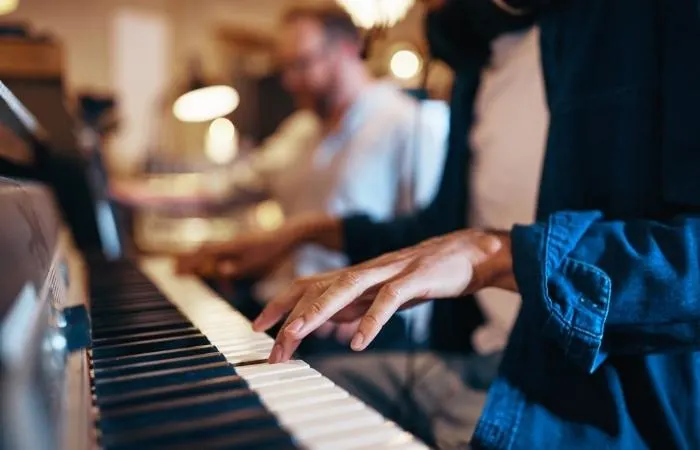
Learning New Production Techniques
A music producer usually develops their own flow or style of working through a song, learning different skills along the way. The benefit you can gain through collaboration is that their flow may have a faster, smoother method or even techniques you never considered!
For example, when I started producing, I learned all about resampling synths and basses from a producer friend. This changed the game for me.
Instead of trying to re-imagine my samples in packs, I made sounds myself from scratch, recorded them, and then worked with them as fresh samples.
Increases Productivity And Improves Workflow
You can never learn enough when it comes to collaborating.
I remember sharing some hotkeys I’d learned with a fellow producer, which totally changed the game for him.
Workflow and songwriting became smoother, faster, and more streamlined, enabling him to get song ideas down without losing the feel of the music.
Smoother workflow = much better productivity for your creative brain!
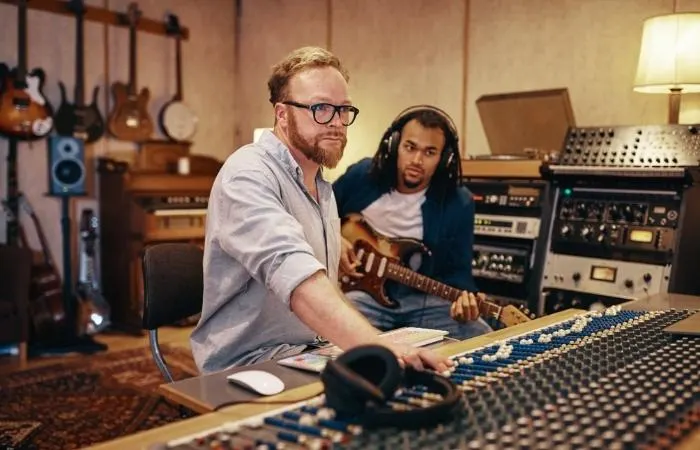
More Feedback And Encouragement
You should avoid relying entirely on your own opinion where possible.
While it may be valid and with experience, music is about enjoying it with others, too, especially if you want to produce a hit song for radio or Spotify, for example.
So by collaborating and sharing in the creative process with another musician, you’ll gain valuable insight into your music.
Increases Your Exposure And Connections
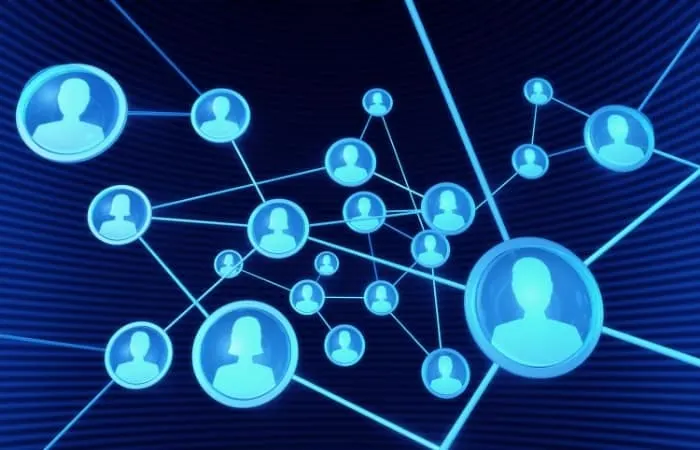
This one is a big deal.
The music industry (and many other industries) revolve around networking, so maintaining connections is essential to gaining more collaborative projects with artists and getting booked for gigs too.
It really is a small world out there, the music world even more so; 6 degrees of separation is a real thing!
You never know how close you could be to industry professionals until you reach out.
How Do I Collaborate With Another Artist?
This is down to how comfortable you are working with others and your relationship with each artist you intend to collaborate with.
There are several ways you can work with other musicians or artists:
In Person Project
In my experience, there is no better way to collaborate with another artist than in person. You can seamlessly provide feedback and encouragement and share ideas as they come to you.
Working in the same space or studio will allow you to hear and develop your songwriting in real-time, and you won’t have to wait to hear back from them like you would if you were apart.
Tips for in-person collaboration:
- Be polite and courteous.
- Freely speak your mind about ideas (don’t hold back any doubts)
- Don’t be afraid if the music doesn’t happen fast!
- Try not to get bogged down with minute details like tweaking equalizers or volumes.
- Have fun and enjoy each other’s company!
Via The Internet
We live in a modern, connected world, so it can easily be exploited to your advantage regarding music collaboration.
You can communicate your ideas to each other via email, social media/messaging apps, or chat hubs such as Discord (I highly recommend this, as you can live-share your screen to work on projects simultaneously!)
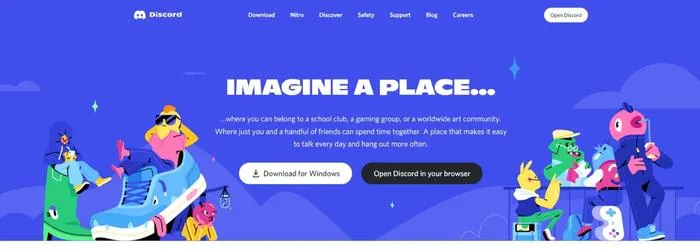
Additionally, the ease with which you can share files over the internet through websites such as WeTransfer or Google Drive greatly helps the creative process.
Suppose you have factors that prevent you from working in real-time. In that case, there are still options, such as Soundcloud, where you can upload your project for your artist to listen back, then communicate their thoughts with you.
Tips for internet-based collaboration:
- Be polite and courteous.
- Outline some structure to the workflow, i.e., working on specific parts of your song (intro, chorus, bass line, drums, etc.)
- Discuss where you would like to see the project go/each other’s vision for the final product
- Aim to make varied versions of your additions to the song (multiple ideas can inspire each of you differently
- Be a clear communicator.
- Respect the creative process. Everybody works at their own pace.
Examples Of Collaborations Aside From Co-producing A Song:
- Remix a popular track
- Collaborate on a Spotify playlist build
- Film or photograph an artist’s event or press shots
- Utilize Instagram or TikTok and create video edits featuring them
- Live question and answer footage
- Share or promote an artist’s album, event, or page.
- Host an artist at a local venue – provide some personal hospitality.
- Trade services to assist them. You may know someone that knows someone!
Where Do You Find Someone To Collaborate With?
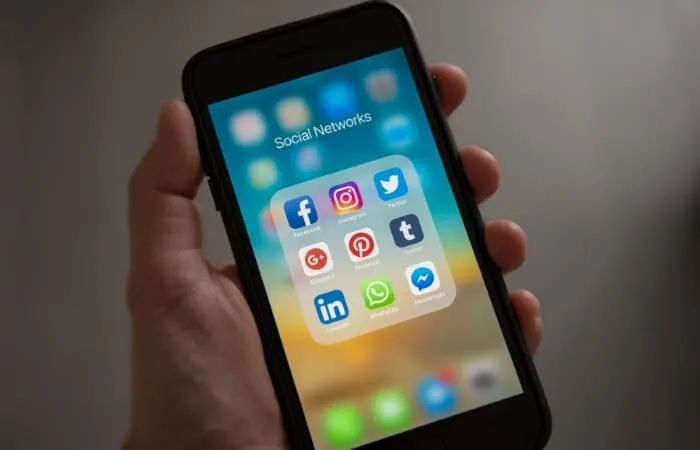
Again, the internet is a wonderful place. There are so many avenues of connecting with people it can seem daunting at first glance. Still, potential artist collaborations are out there in the world.
You just have to go get ’em!
Here are some of my go-to options:
- Social media accounts (Facebook, Instagram, Tiktok)
- Artist profiles (Soundcloud, Spotify, Bandcamp, Youtube)
- Promotional emails
- Music blogs and websites (Reddit, Splice, record labels)
- In your social circles
- At local events or gigs
- Music centers
- Word of mouth
Aside from hunting for potential collaborations, don’t shy away from being vocal about your desire to work with others, either.
Let people know by sharing your projects or ideas on your socials, via your promo emails, or when you’re out and about with friends – you never know who somebody knows!
How To Structure Deals When Collaborating With Other Artists?
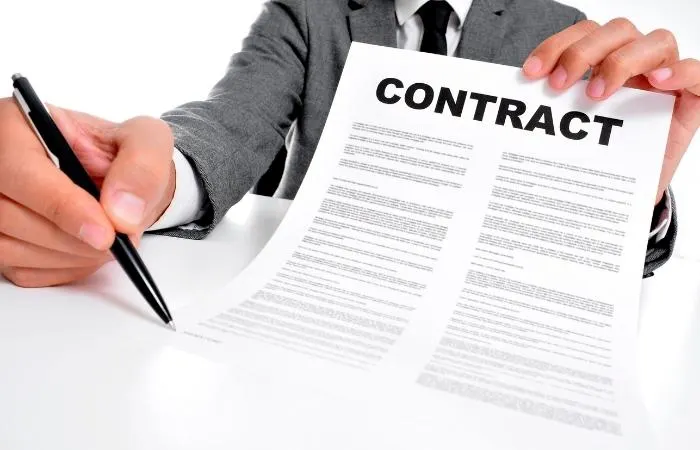
Structuring deals with artists you have collaborated with can be tricky.
One must consider the level of involvement each person has had with the project, the time spent, and the degree of the importance their task had to the final product.
In terms of cost, there are different rates each type of artist will charge for their services.
For example, a hired band may charge hourly compared to a freelancer who creates a video and may ask for a one-time fee for the project.
All must be considered and fairly compensated for their work.
My best advice is to do your own research, understand what rights you have depending on your position within the collaboration, and seek further advice from industry professionals.
Above all, clear and detailed communication here is paramount so that everybody involved understands their place in the process and the implications they may or may not face for any decisions made throughout the collaboration process.
9 Tips For Collaborating With Other Artists
- Honesty is always the best policy
- Plan out your project or vision
- Set achievable goals
- Be personable when reaching out to artists or professionals
- Share Insight and knowledge wherever possible
- Appreciate and get perspective from different points of view
- Don’t be afraid to ask hard questions
- Encourage each other with respective feedback
- Be ready to challenge your state of mind or opinion
So you’ve worked with a producer and are unsure how credits work.
Fear not! Check this following article looking at do producers get songwriting credits.

 Want to connect with other music producers for help and guidance?
Want to connect with other music producers for help and guidance?